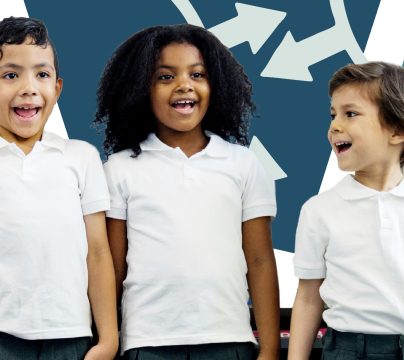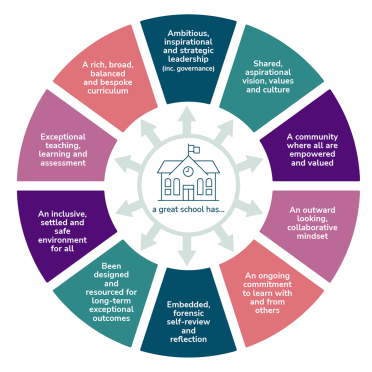A great school models the learning process to its pupils by constantly seeking opportunities for adults to develop and discuss and articulate their personal learning goals and challenges.
At all levels in the school, the community recognises the importance of constantly striving to improve, and builds opportunities for formal and informal learning to improve practice, impact and efficacy. Learning is celebrated throughout the community, with all stakeholders recognising that professional development and personal growth are an ongoing process. Across the organisation, there is evidence that members of the community are able to articulate where and how they wish to improve, and that this is seen as a sign of strength, not weakness.
The learning needs of all staff are regularly reviewed through formal performance development and informal coaching and mentoring. This shapes the learning programme for the school, which is regularly reviewed by leaders to identify school-wide areas of development as well as bespoke training for individuals. The impact of activity undertaken is robustly evaluated. Staff and governors take the lead in their own professional development, identifying areas for personal growth.
The great school is committed to horizon-scanning, enabling their leaders, governors and staff to prepare for new ways of working, emerging foci and best practice. Processes are evaluated, adapted and innovated regularly. A range of learning opportunities are supported, including mentoring, coaching, peer-to-peer support, formal training, networking, higher education courses, action research, reading and online learning.
In a great school, the commitment to learning is constant and sustained, and is seen as a core function and essential part of school life.
This lens will typically be reflected in:
- Teaching and Learning Policy
- CPD Policy
- Performance Development Policy and records
- Monitoring and Evaluation Policy
- Lesson Observation and Feedback Policy
- Governor training records
- Personal development plans
- Training budget allocation
- Succession planning procedures
- Details of staff and governor conferences
- Action research groups
- Teacher/staff learning communities
General documents, policies and procedures in which you might typically see the lenses reflected.
Resources
-
Summer 2021
Rebel Ideas – Matthew Syed, 2020
The Thinking School – Kulvarn Atwal, 2019
Lessons From Lockdown: the Educational Legacy of Covid-19 – Tony Breslin, 2021
The Psychology of Executive Coaching - Bruce Peltier, 2001
Spring 2020
The more you read, the more you’ll know…helping parents to read with their children at home - promoting reading at home
Unique child transition level of need tool in the Supporting Smooth Transitions Toolkit
Autumn 2019
Education Endowment Foundation Teacher Toolkit
Helping Staff Development in Schools - Sara Bubb and Peter Earley, 2010
An Everyone Culture - Robert Kegan and Lisa Lahey et al, 2016
What works best in education – the politic of collaborative expertise - J Hattie, 2015
High Performers: The Secrets of Successful Schools - Alisdair Smith, 2011

Ways in which HFL can provide support
Headteacher and senior leader conferences – Early Years, special, primary and secondary
Trust Leaders’ Forum
SEND conferences
Assessment conferences
HFL Governance conference
Governor training
Data Management Services – user group
HR network for schools HR professionals
Insights Discovery team development - HR Services
Signposting to other partner organisations (Occupational Health, legal etc.)
Great Expectations programme – Early Years, primary and secondary
Early Years annual CPD programmes
Subject programmes: e.g. Reading Fluency, Making Fluent and Flexible Calculators
Early Years Leader Seminars and Early Years e-learning courses
Please contact us for further information on 01438 544464 or email info@hfleducation.org
The Great School Framework is made up of:
Ambitious, inspirational and strategic leadership (inc. governance)
Shared, aspirational vision, values and culture
A community where all are empowered and valued
An outward looking, collaborative mindset
An ongoing commitment to learn with and from others
Embedded, forensic self-review and reflection
Been designed and resourced for long term exceptional outcomes
An inclusive, settled and safe environment for all
Exceptional teaching, learning and assessment
A rich, broad, balanced and bespoke curriculum
The Great School Framework is the intellectual property of HFL Education and copyrighted. It may not be used unacknowledged by others.


